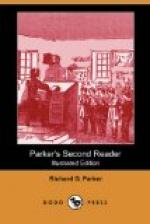19. When the farmer came down to breakfast that morning, upon looking at the clock, he declared that his watch had gained half an hour in the night.
LESSON V.
Address of the Author to the Pupil,—continued from Lesson 3d.
1. The fable of the old clock, which has just been read, is intended to teach us a lesson, or moral, and that is, that whenever we have anything to do, whether it be a long lesson or a piece of hard work, we must not think of it all at once, but divide the labor, and thus conquer the difficulty.
2. The pendulum was discouraged when it thought that it had to tick eighty-six thousand four hundred times in twenty-four hours; but when the dial asked it to tick half a dozen times only, the pendulum confessed that it was not fatiguing or disagreeable to do so.
3. It was only by thinking what a large number of times it had to tick in twenty-four hours, that it became fatigued.
4. Now, suppose that a little boy, or a little girl, has a hard lesson to learn, and, instead of sitting down quietly and trying to learn a little of it at a time, and after that a little more, until it is all learned, should begin to cry, and say I cannot learn all of this lesson, it is too long, or too hard, and I never can get it, that little boy, or girl, would act just as the pendulum did when it complained of the hard work it had to do.
5. But the teacher says to the little boy, Come, my dear, read over the first sentence of your lesson to me six times. The little boy reads the first sentence six times, and confesses to his teacher that it was not very hard work to do so.
6. The teacher then asks him to read it over six times more; and the little boy finds that, before he has read it to his teacher so often as the six times more, he can say it without his book before him.
7. In this way, that little boy will find, that it is not, after all, so hard work to get what he calls a hard lesson; because all that he has to do, is to read a small portion of the lesson at a time, and to repeat the reading of that small portion until he can repeat it without the book.
8. When he has done this, he can take another small portion of the lesson, and do the same with that, until, by degrees, he has learnt the whole lesson; and then he will feel happy, because he knows that his teacher, and his parents, will be pleased with him.
9. But some pupils say to themselves, when they have a lesson to learn, I do not want to study this lesson now; I will study it by and by, or to-morrow morning.
10. But, by and by, and when to-morrow comes, they feel no more disposed to study their lesson than they did when the lesson was first given to them.
11. Now, my little friend, if you wish your time at school to pass pleasantly, do not say to yourself, I will get my lesson by and by, or to-morrow, but set yourself about it immediately, learn it as quickly as you can, and I will assure you will not only make your teachers and your parents happier, but you will be much happier yourself.




